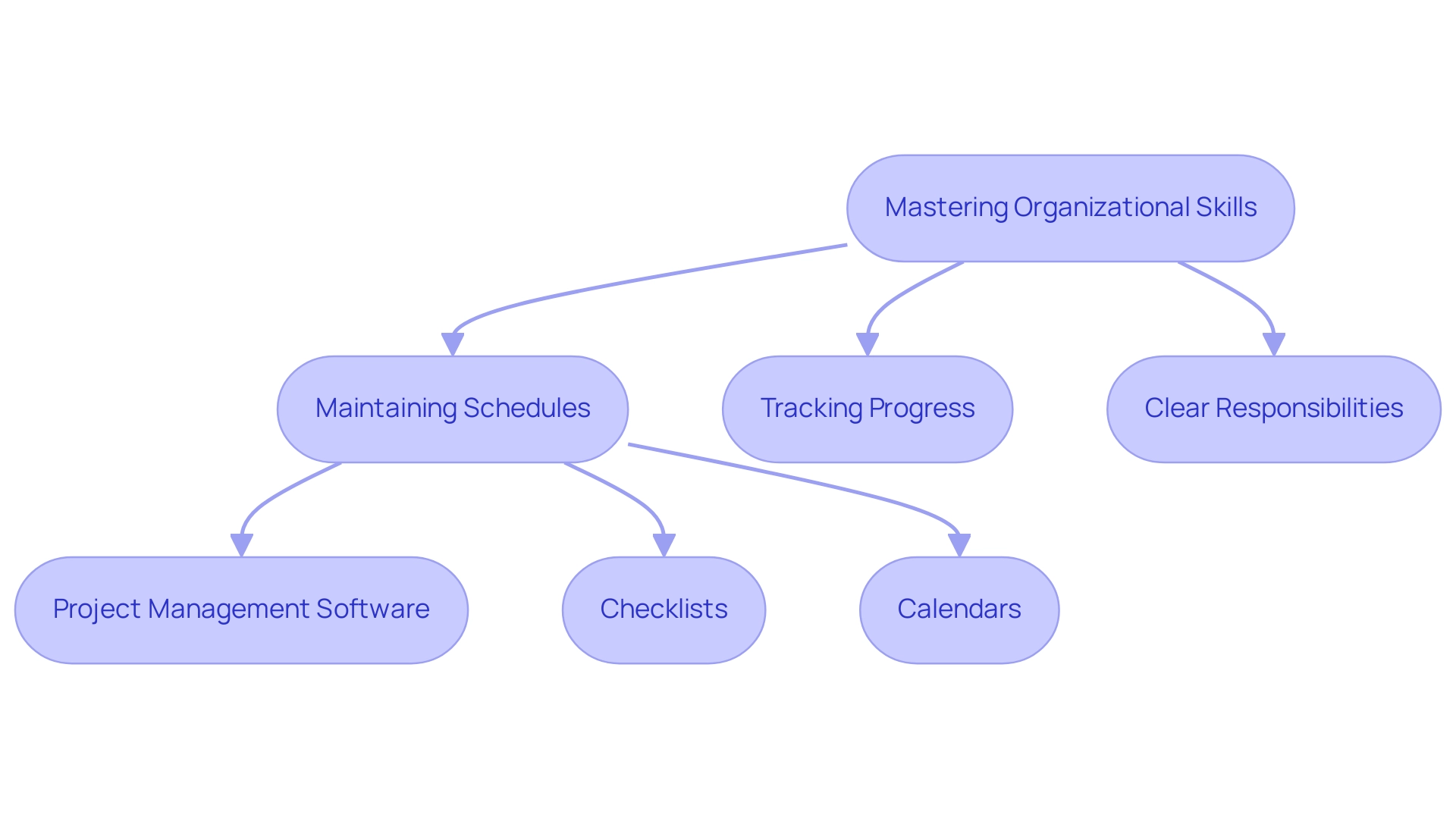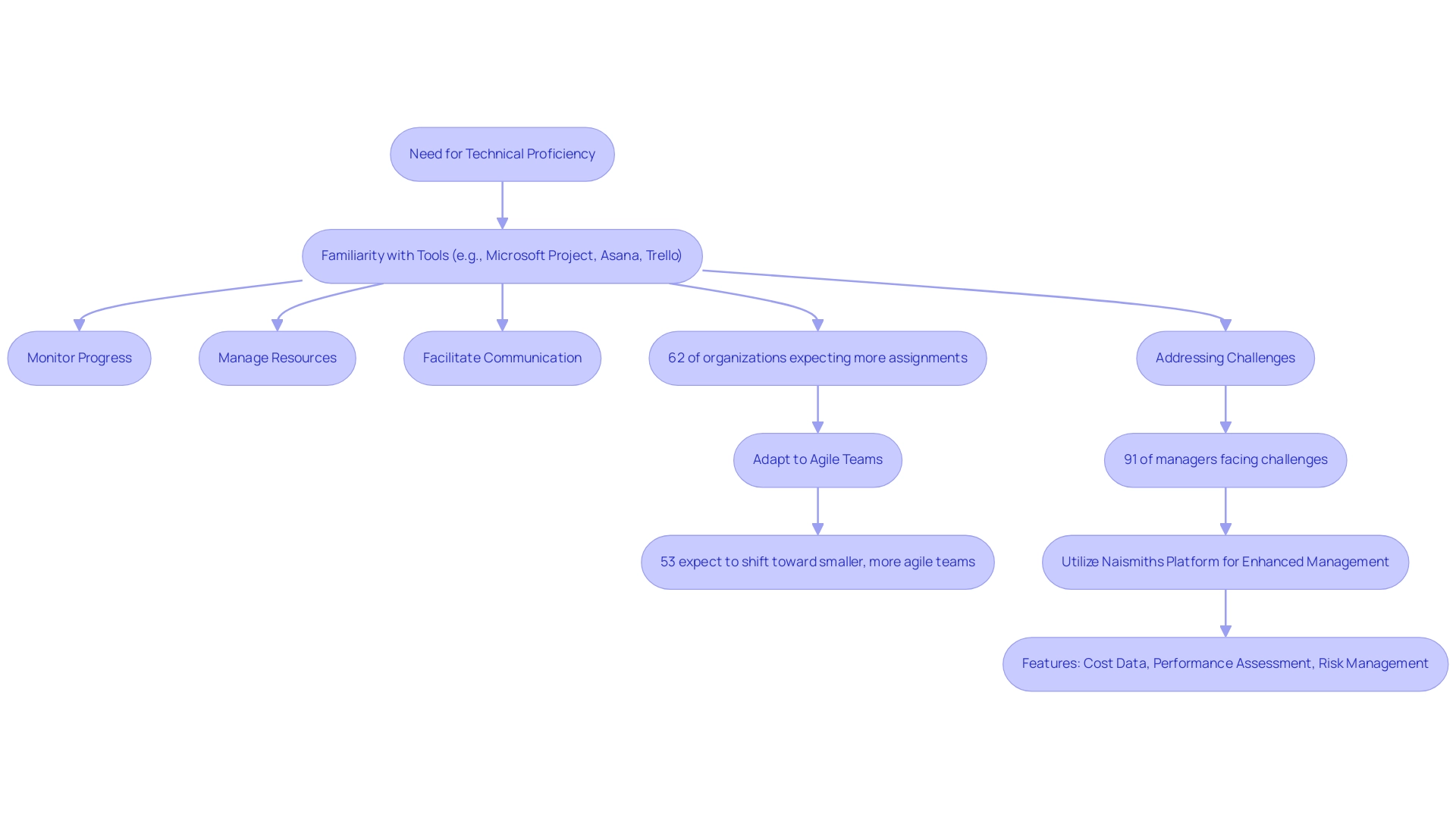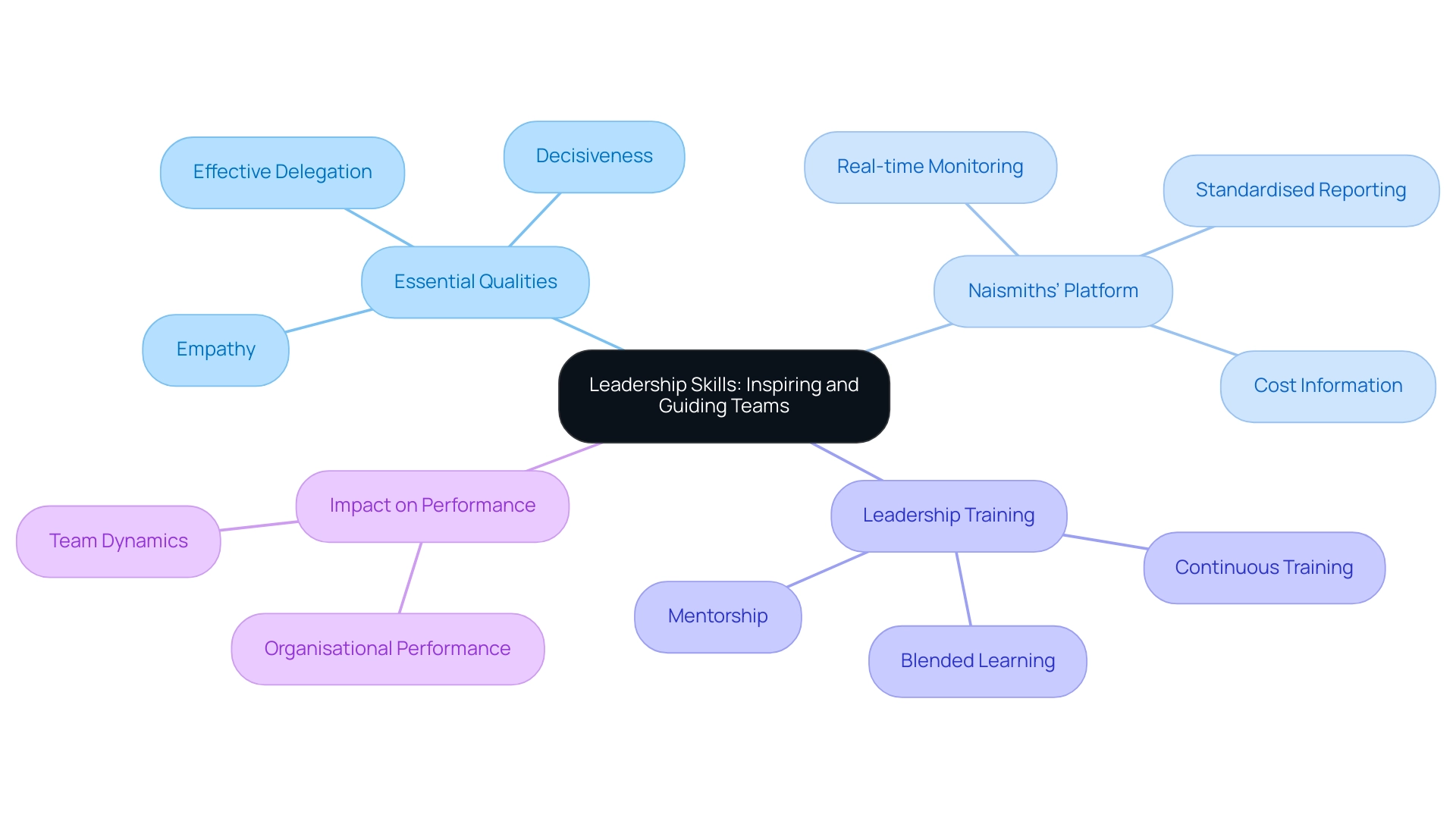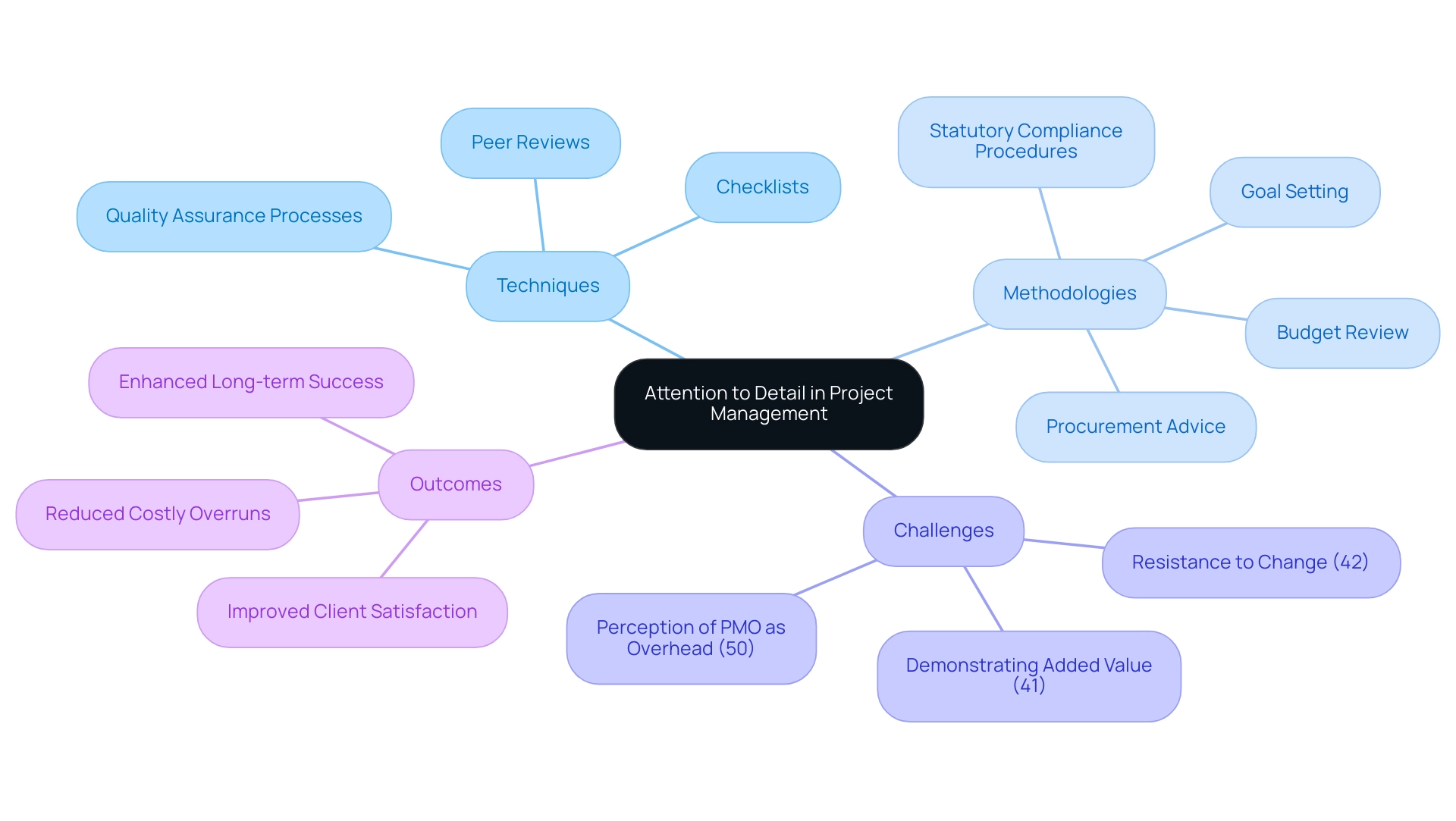
Overview
The essential skills that every assistant project manager must possess include:
- Effective communication
- Organisational abilities
- Problem-solving skills
- Time management
- Technical proficiency
- Leadership capabilities
- Adaptability
- Attention to detail
- Negotiation skills
These competencies are crucial for navigating the complexities of project management, particularly within the construction sector. They enhance collaboration, ensure project quality, and facilitate successful outcomes amidst dynamic challenges. By mastering these skills, assistant project managers position themselves to tackle the multifaceted demands of their roles with confidence and competence.
Introduction
In the intricate realm of project management, the Assistant Project Manager (APM) stands out as a pivotal figure, particularly within the construction industry. Charged with a diverse array of responsibilities, APMs serve as the backbone of project execution, ensuring that:
- Plans are meticulously crafted
- Timelines are adhered to
- Communication flows seamlessly among stakeholders
As the demand for skilled project management professionals continues to surge, the significance of APMs becomes increasingly apparent. Mastering organisational skills, effective communication, and adept problem-solving to navigate unexpected challenges, these professionals must be equipped with a comprehensive toolkit to propel projects toward success. This article explores the essential skills that define a successful APM, underscoring their influence on project outcomes and the evolving landscape of construction management.
Understanding the Role of an Assistant Project Manager
The role of an assistant project manager is pivotal in the management landscape, particularly within the construction sector. The assistant project manager (APM) supports managers by overseeing critical tasks such as planning, scheduling, and facilitating communication among diverse teams and stakeholders. Their involvement is essential for ensuring that projects progress seamlessly and efficiently, often serving as the vital link that connects various parties engaged in an initiative.
In the construction industry, where timelines and budgets are frequently tight, the ability of an assistant project manager to manage multiple tasks and prioritise effectively is crucial. This role demands not only strong organisational skills but also a proficiency in analytical thinking and problem-solving. Professionals in this field must navigate complex dynamics, making their contributions indispensable for maintaining momentum and quality standards.
Statistics reveal that the demand for management professionals is on the rise, with an expected 2.2 million new positions emerging annually in the United States alone. This growth underscores the increasing recognition of the importance of application performance metrics in driving project success, as they play a critical role in managing the intricacies of construction projects.
Moreover, the skill set required for an assistant project manager extends beyond technical knowledge. Key competencies such as analytical thinking, effective communication, critical thinking, interpersonal skills, organisational abilities, problem-solving, and time management are essential for fostering collaboration among diverse teams. These skills are vital for managers to effectively oversee their responsibilities and enhance overall success.
Naismiths distinguishes itself through director-led instruction and a commitment to prioritising clients’ commercial interests, which enhances the effectiveness of project managers in navigating sensitive situations.
Naismiths N3 platform, further empowers project managers by providing reliable data analysis and benchmarking based on real-time and historical data. This platform enables professionals to simulate scenarios and stress-test key variables, ensuring informed decision-making and comprehensive risk management throughout the project lifecycle. Furthermore, understanding asset management in construction is crucial for asset managers, as it involves overseeing and tracking all assets, from workforce to equipment, ensuring that each component aligns with the highest industry standards.
Naismiths also offers comprehensive solutions for precise cost data and performance evaluation, which are critical for asset managers in making strategic decisions that can significantly impact investment outcomes. By leveraging these tools and insights, the role of assistant project manager can greatly enhance contributions to project success and align their efforts with the interests of investment fund managers.
In summary, the role of the assistant project manager is vital to the success of construction initiatives. Their ability to manage multiple responsibilities while ensuring clear communication and adherence to timelines positions them as key players in the construction industry, ultimately contributing to the successful delivery of projects.
Effective Communication: The Cornerstone of Project Management
Effective communication stands as a cornerstone for the role of assistant project manager, enabling seamless information exchange among team members, clients, and stakeholders. Expertise in both verbal and written communication is crucial, as those in this role must convey updates, changes, and expectations with clarity and precision. This proficiency not only fosters strong relationships but also builds trust, two critical components for successful execution.
To enhance communication effectiveness, APMs can employ several techniques:
- Active Listening: Engaging fully in conversations to understand the perspectives and concerns of others.
- Clear Reporting: Providing concise and jargon-free updates that are easily digestible for all stakeholders.
- Regular Updates: Keeping all parties informed about progress and any changes, which helps in managing expectations and mitigating risks.
Statistics indicate that organisations prioritising effective communication experience a significant impact on success. For instance, 61% of high-performing organisations offer leadership training, underscoring the importance of developing communication skills within teams. Additionally, the incorporation of AI tools, can enhance meetings by recording, transcribing, translating, and summarising discussions, enabling APMs to concentrate on essential elements of their work.
Case studies demonstrate the transformative influence of effective communication in overseeing endeavours. For example, companies leveraging AI technologies for workplace communication have reported enhanced efficiency and collaboration, with 73% planning to implement AI-powered chatbots for instant communication.
Moreover, the principles of Lean Construction highlight how effective communication can enhance efficiency, reduce delays, and improve collaboration in the construction industry. Naismiths highlights risk management and a collaborative spirit, ensuring that all parties attain the best possible results while upholding high-quality standards throughout each project. This highlights the importance of robust communication abilities for assistant project managers, particularly within the framework of Naismiths’ methodologies, which emphasise proactive engagement and clear information sharing.
By refining their communication skills, team leaders can significantly impact success and enhance the overall effectiveness of their groups, particularly in relation to Naismiths’ commitment to providing customised solutions in the construction sector.
Mastering Organisational Skills for Project Success
Mastering organisational skills is essential for an assistant project manager to navigate the complexities of overseeing tasks effectively. This includes maintaining schedules, tracking progress, and ensuring that all team members are clear about their responsibilities. Statistics reveal that only 36% of teams in underperforming companies successfully complete their assignments, underscoring the critical role of organisation in achieving task success and the potential repercussions of ineffective practices.
To enhance organisational abilities, APMs can leverage various tools such as project management software, checklists, and calendars. These resources streamline tasks and facilitate improved communication among team members. A well-organised APM anticipates potential issues and addresses them proactively, significantly contributing to the overall success of the project.
Best practices for management organisation in 2025 emphasise the importance of adopting a predefined methodology, with 60% of managers reporting the use of such frameworks. This structured approach enables consistent tracking and reporting, ensuring that tasks remain on schedule and within budget. By incorporating these methodologies, project management professionals can enhance their organisational efficiency and improve outcomes.

Problem-Solving Skills: Navigating Project Challenges
Problem-solving abilities are essential for Assistant Project Managers, particularly in the dynamic landscape of construction projects, where unforeseen obstacles frequently arise. Professionals must possess the capability to analyse complex situations, identify root causes, and swiftly devise effective solutions. Techniques such as brainstorming, root cause analysis, and collaborative problem-solving serve as vital tools that enhance an assistant project manager’s capacity to navigate challenges effectively.
The significance of these skills is underscored by a recent study evaluating key competencies among managers, revealing that communication skills, technical knowledge, and effective leadership are crucial for successful execution. Notably, 41% of organisations struggle to demonstrate the added value of their Project Management Offices (PMOs), underscoring the critical role Project Managers play in showcasing their contributions through adept problem-solving.
Moreover, fostering a proactive approach to problem-solving not only minimises disruptions but also sustains the momentum of initiatives. Professionals who can effectively handle project challenges are better positioned to influence positive outcomes, ensuring that projects remain on track and meet quality standards. Naismiths’ comprehensive property development platform enhances this capability by providing accurate cost data, real-time monitoring solutions, and robust risk management tools.
In summary, the impact of problem-solving on results cannot be overstated. Individuals equipped with robust problem-solving techniques, supported by Naismiths’ N3 platform, are invaluable assets as assistant project managers, driving initiatives toward successful completion even in the face of adversity. The PMSS serves as a systematic measure for evaluating these abilities, highlighting their significance in the realm of programme oversight.
Time Management: Keeping Projects on Track
Time coordination is a crucial skill for an assistant project manager, significantly influencing the overall success of building projects. Individuals must excel in prioritising tasks, establishing realistic deadlines, and effectively managing their time to navigate the complexities of demands. Techniques which encourage focused work sessions followed by short breaks, and time blocking, where specific periods are allocated for particular tasks, can greatly enhance productivity.
Frequent progress evaluations serve an essential function in sustaining momentum and ensuring alignment with objectives. Mastering these time organisation strategies not only assists the assistant project manager in keeping tasks on schedule but also aids in remaining within budget, ultimately resulting in greater client satisfaction. In fact, statistics suggest that 33% of employees believe that embracing chrono working methods could significantly enhance their concentration and output, underscoring the importance of efficient time organisation in the workplace.
The significance of time organisation in construction projects cannot be overstated. It directly impacts completion rates and overall success. A case study from the Project Planning Institute highlights the increasing demand for project professionals. This surge is driven by the evolving demands of the industry, emphasising the necessity for robust time coordination training and development to mitigate potential losses in global GDP due to talent shortages. This increasing demand highlights the essential requirement for professionals to cultivate strong time organisation abilities to meet industry expectations.
Experts advise assessing schedules, making prompt decisions, and assigning tasks as effective techniques for utilising time efficiently. By applying these practices, project leaders can foster a cooperative atmosphere that emphasises risk oversight, ensuring that all stakeholders achieve excellent results while maintaining high-quality standards across every endeavour.
Technical Proficiency: Leveraging Project Management Tools
Technical expertise stands as a cornerstone for Assistant Managers, particularly in the effective utilisation of management software and tools. Familiarity with platforms such as Microsoft Project, Asana, and Trello is essential; these tools empower managers to monitor progress, manage resources efficiently, and facilitate clear communication among team members. With 62% of organisations anticipating a rise in assignments, the demand for proficient APM professionals capable of skillfully maneuvering these technologies is more critical than ever.
Furthermore, continuous learning and staying abreast of the latest management tools are vital for enhancing an APM’s efficiency and effectiveness. As the construction industry evolves, the ability to leverage advanced software solutions becomes increasingly important. For instance, 53% of organisations expect to transition toward smaller, more agile teams, necessitating that APMs adapt swiftly and utilise technology to streamline workflows.
Statistics reveal that 91% of managers face challenges within their organisations, such as shifting teams and the rapid pace of initiatives. Addressing these challenges through optimised workflows and resource planning is crucial for improving effectiveness in overseeing initiatives. By mastering software for task management, APMs can mitigate uncertainties and ensure that initiatives remain on track, ultimately leading to successful outcomes.

Leadership Skills: Inspiring and Guiding Teams
Leadership abilities are crucial for the assistant project manager, who plays a pivotal role in motivating and directing their teams toward successful outcomes. Project managers must actively cultivate essential qualities such as empathy, decisiveness, and effective delegation. By fostering a cooperative atmosphere and encouraging transparent communication, project leaders can significantly enhance team dynamics, which is vital for achieving success.
Research indicates that inclusive leadership training, which extends beyond senior roles, can lead to substantial improvements in organisational performance, including financial metrics and employee engagement. This underscores the significance of leadership growth at every level, particularly for assistant project managers who are often at the forefront of execution. Furthermore, case studies have demonstrated that organisations with a well-organised Project Management Office experience improved productivity and clarity in their management processes. However, only 41% of these organisations report strong alignment with their overall strategy, highlighting the need for effective leadership to bridge this gap.
To inspire and guide teams effectively, these professionals should engage in continuous leadership training and mentorship. Blended learning methods, which combine in-person instruction with digital components, have proven effective in enhancing leadership training results, facilitating the acquisition and improvement of competencies. Expert insights highlight that a customer-focused approach can improve risk oversight and promote a cooperative atmosphere, ensuring that all participants achieve the most favourable outcomes while maintaining high-quality standards throughout every task.
In summary, the influence of leadership on team performance cannot be overstated. Individuals who prioritise the enhancement of their leadership abilities while utilising Naismiths’ N3 platform for precise data and risk management are better equipped to navigate the complexities of construction endeavours, ultimately promoting success and nurturing a culture of excellence within their teams.

Adaptability: Thriving in a Changing Environment
Adaptability serves as a fundamental skill for Assistant Project Managers, enabling them to navigate the intricacies of fast-paced and dynamic environments. In an industry where only 47% of initiatives are overseen by professional managers, the capacity to embrace change and adjust plans is essential. Individuals must cultivate a mindset that embraces flexibility, allowing them to respond effectively to unexpected challenges and evolving requirements.
To enhance adaptability, project managers can implement techniques such as agile management and iterative planning. These methodologies not only promote responsiveness but also foster a culture of continuous improvement within teams. By nurturing an environment where team members feel empowered to share ideas and adjust strategies, Assistant Project Managers (APMs) can steer their initiatives toward success, even amidst adversity.
Statistics reveal that 45% of managers consistently demonstrate cultural adaptability, underscoring the necessity of this skill in diverse settings. As industries, particularly construction, grapple with the challenges of adopting more flexible methodologies, the commitment to maintaining strict budgets and timelines remains paramount. This highlights the significance of adaptability in ensuring that initiatives not only meet their goals but also align with the shifting needs of stakeholders.
Successful adaptability strategies in construction initiatives often involve proactive communication and collaboration among team members. By prioritising open dialogue and risk oversight, project leaders can cultivate a collaborative spirit that enhances outcomes.
Expert insights indicate that succeeding in evolving assignment environments necessitates a combination of technical expertise and interpersonal skills, allowing managers to navigate complexities with confidence.
The emphasis on adaptability competencies in management will continue to grow, as organisations seek assistant project managers who can efficiently manage change while delivering high-quality outcomes. By refining these abilities and leveraging Naismiths’ N3 development platform, professionals position themselves as indispensable resources in the construction sector, capable of guiding initiatives toward success in the face of uncertainty. The construction sector’s ongoing commitment to predictive models, despite the challenges in adopting more flexible methods, further underscores the essential need for advanced project management systems to be adaptable in their approach.
Attention to Detail: Ensuring Quality in Deliverables
Attention to detail is a cornerstone skill for an assistant project manager, significantly influencing the quality of deliverables. These professionals are tasked with the thorough examination of documents, plans, and reports to ensure compliance with established standards. Studies indicate that 41% of professionals in oversight roles find illustrating the added value of their processes a significant challenge, underscoring the critical need for accuracy in every aspect of supervision.
To uphold high standards, assistant project managers can employ various techniques, such as:
- Checklists
- Peer reviews
- Robust quality assurance processes
These methods not only facilitate the early identification of potential errors but also enhance overall client satisfaction by ensuring that deliverables meet or exceed expectations. The integration of technology and agile methodologies in task oversight further emphasises the necessity for detail-oriented practices, as organisations increasingly transition towards smaller, more agile teams that demand clear communication and thorough documentation.
Naismiths’ comprehensive approach to asset oversight in construction is pivotal in this context. By leveraging their platform, Project Managers can access accurate cost data, performance assessments, and real-time monitoring solutions, which are essential for effective risk management. Naismiths employs specific methodologies, including a structured overview of phases encompassing:
- Goal setting
- Budget review
- Procurement advice
- Statutory compliance procedures
Case studies reveal that successful quality assurance processes in construction endeavors hinge on a strong focus on detail, often facilitated by the assistant project manager. For instance, firms prioritising meticulous monitoring of their initiatives, aided by an assistant project manager from Naismiths, have reported improved outcomes and reduced instances of costly overruns.
Additionally, the report titled “Future of Project Management” discusses how organisations are adapting to new methodologies and technologies, reinforcing the importance of detail-oriented practices in this evolving landscape. By fostering a culture of attention to detail, associates not only mitigate risks but also enhance the long-term success of their initiatives.
Furthermore, it is important to acknowledge that:
- 50% of respondents perceive PMO processes as overhead
- 42% report resistance to change
This highlights the broader challenges faced in management that necessitate a strong focus on quality assurance.

Negotiation Skills: Securing Resources and Managing Expectations
Negotiation skills are critical for assistant project managers, who frequently encounter situations where securing resources and managing stakeholder expectations are of utmost importance. Mastery of negotiation methods, such as active listening, empathy, and conflict resolution, enables managers to adeptly navigate complex dynamics. By fostering collaborative negotiations and striving for win-win outcomes, assistant project managers (APMs) can enhance relationships with stakeholders, ultimately contributing to project success.
The significance of negotiation in project oversight cannot be overstated. According to the Project Management Institute (PMI) and the Association for Project Management (APM), negotiation is an essential skill that impacts budget management, contract negotiations, scope definition, and conflict resolution among team members and stakeholders. Effective negotiation not only results in mutually beneficial outcomes but also cultivates trust and cooperation, which are vital for managing stakeholder expectations. Statistics reveal that negotiation scenarios often demand considerable time and effort, with participants averaging over 43 minutes to reach agreements.
Continuous practice and training in these areas can significantly enhance the assistant project manager’s negotiation capabilities, ensuring they are well-equipped to manage resources effectively and drive project success.
Conclusion
The role of an Assistant Project Manager (APM) is undeniably crucial in the construction industry, serving as a linchpin in the successful execution of projects. The skills discussed throughout this article, effective communication, strong organisational abilities, adept problem-solving, excellent time management, technical proficiency, leadership capabilities, adaptability, attention to detail, and negotiation skills, collectively shape the effectiveness of APMs. Each of these competencies not only facilitates smoother project operations but also enhances collaboration among stakeholders, ultimately contributing to project success.
As the demand for project management professionals continues to rise, so too does the necessity for APMs to master these essential skills. With the construction industry evolving rapidly, APMs must remain agile and responsive to changes while ensuring that projects adhere to timelines, budgets, and quality standards. The integration of advanced tools and methodologies, such as those offered by Naismiths, equips APMs with the resources needed to navigate complex project landscapes effectively.
In summary, the Assistant Project Manager’s role is integral to driving projects forward, ensuring that all elements align toward achieving desired outcomes. By honing their skills and leveraging the right tools, APMs can not only meet the industry’s growing demands but also position themselves as invaluable assets in the quest for excellence in project management. Embracing these competencies will undoubtedly lead to more successful projects and a more resilient construction industry.